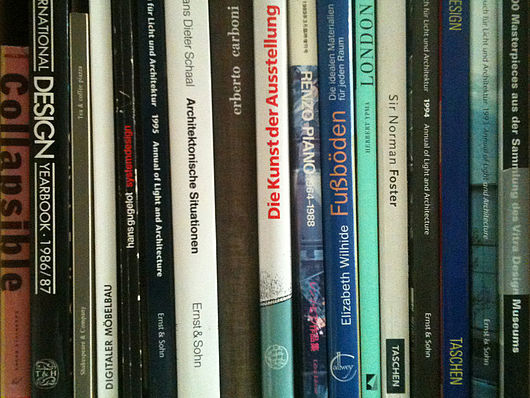Book Recommendations
from "must haves" to gift ideas
Firstly: this is a completely subjective choice
that we are constantly expanding. Most of the books you will find in BURG library or belong to me privately. You are welcome to borrow them.
Secondly: Most books can be bought second hand off of Amazon, its worthwhile in any case. Disadvantage: you can not give it back. If you cannot find a book there look at “Zentrales Verzeichnis Antiquarischer Bücher” (zvab.de).
Must haves for interior architects
• Bauentwurfslehre, E. und P. Neufert, Vieweg
handbook for planners, available only in German
• Möbel und Einbauschränke, W. Nutsch, DVA
fundamentals of furniture making, available only in German
• Innenausbau, W. Nutsch, DVA
fundamentals of interior constructions, available only in German
• Architektur konstruieren, A.Deplazes, Birkhäuser
fundamentals of constructing, available only in German
• A Pattern Language/Eine Mustersprache, Christopher Alexander
A bible for designer. You can use this book to design a house for yourself with your family; you can use it to work with your neighbours to improve your town and neighbourhood; you can use it to design an office, or a workshop, or a public building. And you can use it to guide you in the actual process of construction.
Materials
• Katalog Gesamtsortiment, Modulor
more than 20.000 different materials and products; www.modulor.de/en/
• materiology, D. Kula und E. Ternaux, Birkähser/Frame
a handbook for students and new professionals as well as for experienced professionals, written in a clear, understandable style.
• Maunfacturing Processes for Design Professionals, R. Thomson, Thames&Hudson
This fundamental new resource explores innovative production techniques and materials that are having an impact on the design industry worldwide. Organized into four easily referenced parts Forming, Cutting, Joining, and Finishing over seventy manufacturing processes are explained in depth with full technical descriptions; analyses of the typical applications, design opportunities, and considerations each process offers; and information on cost, speed, and environmental impact.
• Handbuch für Technisches Produktdesign, Dr. S. Peters, Springer
explores innovative production techniques and materials that are having an impact on the design industry worldwide; available only in German
Information - General
• ManuSkript, Axel Müller-Schöll, Birkäuser
a collection of essentials to skim through; available only in German
Information - Acoustics
• Schalschutz und Raumakustik, U. Werner, Bauwerk
fundamentals of acoustics; with many sample calculations and rules of thumb; available only in German
• Akustik und Schallschutz, E. Mommertz, Edition Detail
fundamentals, many application examples, available only in German
Information - Statics
• Deformation und Gestaltung, E. Scharnowski
fundamentals of statics, available only in German
• Fibel zum konstruktiven Entwerfen, D. Althaus, Bauwelt
fundamentals of statics and construction, available only in German
• Leicht Weit - light structures, J. Schlaich, Prestel
work report of one of the most outstanding contemporary civil engineers, available only in German
Information - Lighting
• Handbuch für Lichtgestaltung. Band 1: Lichttechnische und wahrnehmungspsychologische Grundlagen, Ch. Bartenbach, Springer
fundamentals of lighting and light design, available only in German
Something interesting, Standards, for Xmas...
• typografie, Otl Aicher, Ernst&Sohn
fundamentals of scripture and type design, available only in German
• 100 Masterpieces, Vitra
100 chairs with a good description why they are design icons, available only in German
• Der Möbelbau, F. Spannagel, Verlag Th. Schäfer
fundamentals of classic furniture construction, available only in German
• collapsible, P. Mollerup, Chronicle Books
everything there is about folding
Design trends you should to know:
• hfg Ulm, 55-69
saw itself as successor of the Bauhaus; very utilitarian, radical functional approaches; graduates shaped the world of design
• Archigram 1961-74, London
Group of architects, utopian architecture like walking city, blow out village, plug in university
• Memphis, Mailand
most important design trend of the 1980’s; against the emotionless design; design is allowed to be colourful and fun
• Alchemia
group around Mendini, very cerebral, philosophical approaches
• Haus-Rucker/Coop Himmelb(l)au
austrian imprint of the 1968’s; urban-spatial interventions to deconstructivism; group had an interesting ordeal, first only small radical models and later they are allowed to contribute to major tasks
...will be completed...

